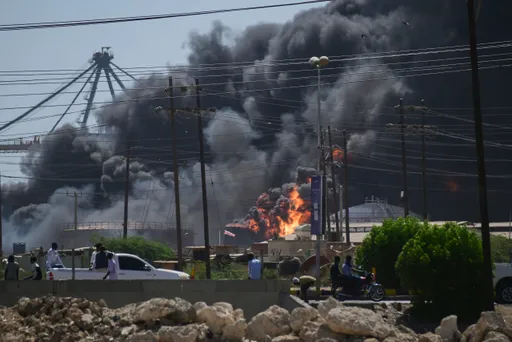By Abdulwasiu Hassan
Imagine the humdrum of a busy highway suddenly disrupted by the ominous noise of a tanker flipping over.
The vehicle, bearing 45,000 litres of petrol, skids across the asphalt, sparks flying as metal grinds against the road.
Scores of bystanders immediately rush to the scene, eager to scoop up the fuel spilling out of the tanker.
Within moments, a deafening explosion sends flames and plumes of thick, black smoke billowing into the sky. The intense heat radiates outward, scorching everything in its path.
Nigerian Magaji Saidu knows precisely what this scene looks like. He can feel the helplessness coursing through his bones as he recalls the disaster that unfolded before him around 11pm on October 15 last year.
"Seeing near and dear ones enveloped in flames and crying out for help while we stood at a distance — that's as painful as being in the middle of it," Magaji tells TRT Afrika of the tanker blast at Majiya in Jigawa State.
Videos circulating on social media show a crowd around the tanker, using buckets and jerrycans to collect as much fuel as possible.
Magaji recalls being startled by the bang of the explosion and rushing out of home to see several relatives and friends caught in the inferno.
The fire killed over 200 people and left scores of others injured, many of whom remain in hospital.
Over three months after the accident, Magaji feels his heart racing whenever he hears anything resembling the highway commotion that culminated in the horrors of that night.
Recurring disasters
Fuel tanker explosions triggered by road accidents are being reported with alarming frequency.
In September last year, a tanker collided with a truck carrying passengers and cattle in Niger State, killing 59.
On January 18, tragedy struck again in Niger State, with about 100 lives being lost in an explosion as people were scooping fuel flowing out of an upturned tanker transporting 60,000 litres of fuel.
About a week later, Enugu State in southeastern Nigeria was mourning over 20 deaths in an accident involving a fuel-laden tanker that veered off the road and erupted in flames.
Over 300 people have been killed in petrol tanker accidents in the past few months alone.
Data analysis by Türkiye's Anadolu Ajansı pegs the number of people killed in tanker incidents from 2009 onwards at 1,896 in 172 tanker accidents, excluding the 20-odd deaths in Enugu State.
Unanswered questions
The recurrence of tanker explosions and more than 2,000 deaths in the past 16 years have raised questions about whether the safety loopholes remain unplugged.
"A couple of factors are responsible for recurrent truck rollovers that result in fuel spillage," George Ene-Ita, director of public affairs for Nigerian Midstream and Downstream Petroleum Regulatory Authority (NMDPRA), tells TRT Afrika.
The agency, which oversees the transportation of petroleum products in Nigeria, lists reckless driving and ignorance of road safety guidelines, poor condition of some of our roads, and the ramshackle condition of some tankers as the leading causes of these accidents.
After almost every such accident, the standard advice from the authorities is for people to exercise caution.
"Whenever spillage from a toppled fuel tanker happens, communities should immediately take responsibility and call security and safety agencies such as the fire service, the Federal Road Safety Corps, police or local govt authorities," says Ene-Ita.
"They should also take responsibility for cordoning off the vicinity of the accident site to prevent people from attempting to collect spilt fuel."
Pipeline system
As Africa's leading oil producer continues to improve its refining capacities, experts advocate also focusing on alternative means of transporting fuel across the country by leveraging its pipeline network.
Nigeria has at least 5,000km of pipelines that are used to transport petroleum products across the country.
"Unfortunately, many of our pipelines have been subjected to vandalism by unscrupulous people and extremist elements," says Ene-Ita.
Last year, Mele Kyari, the group chief executive officer of Nigerian National Petroleum Corporation (NNPC), said the corporation would replace its entire petroleum pipeline network within three years.
"Pipelines are the most cost-effective way to transport petroleum products," Kyari said. "That's why our NNPC network connects nearly all geopolitical zones, with 27 stations and over 5,000km of pipelines. However, many are nearing the end of their useful life and need replacing."
But while Nigerians are waiting for the country's pipelines to be replaced, experts believe the government would need to improve other means of transportation to avoid tanker accidents.
Ene-Ita is hopeful that the effort by the Nigerian government to invest in road rehabilitation, reconstruction, railroad development, and the road safety agency's campaign to raise awareness among truck drivers will make accidents a thing of the past.
The NMDPRA will scale up its safety awareness campaigns so that people realise the grave danger of trying to scoop up fuel from fallen tankers.
"We will also have to review our guidelines and see how we can get these marketing companies to assume a more hands-on approach in dealing with their logistics and transport people," says Ene-Ita.
Those like Magaji who have been directly or indirectly affected by the tanker explosions will be hoping that efforts by the authorities make oil transportation safer for everyone.
➤ Click here to follow our WhatsApp channel for more stories.



























